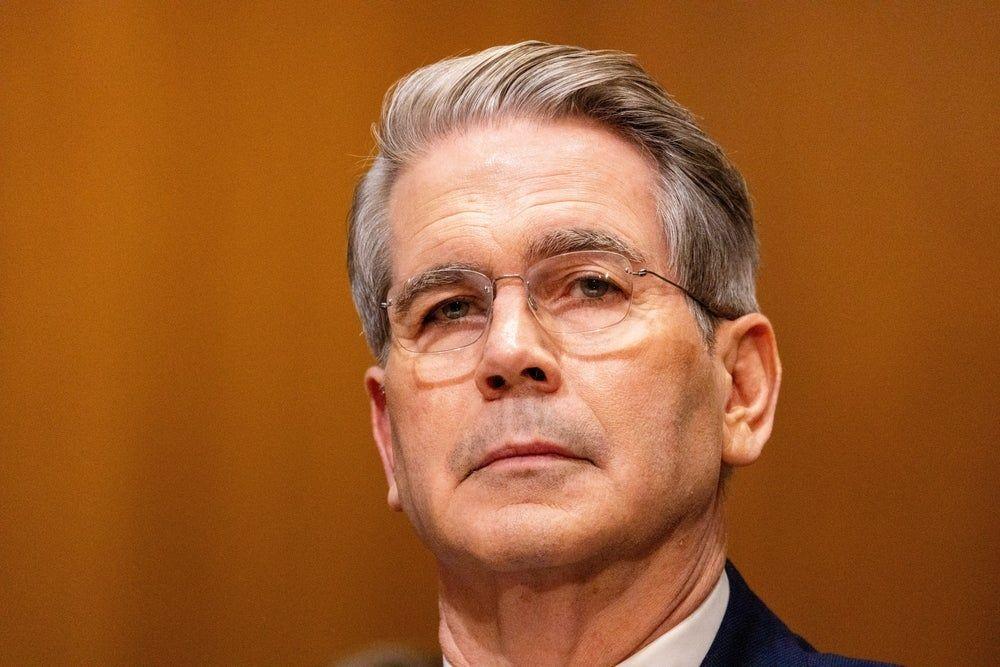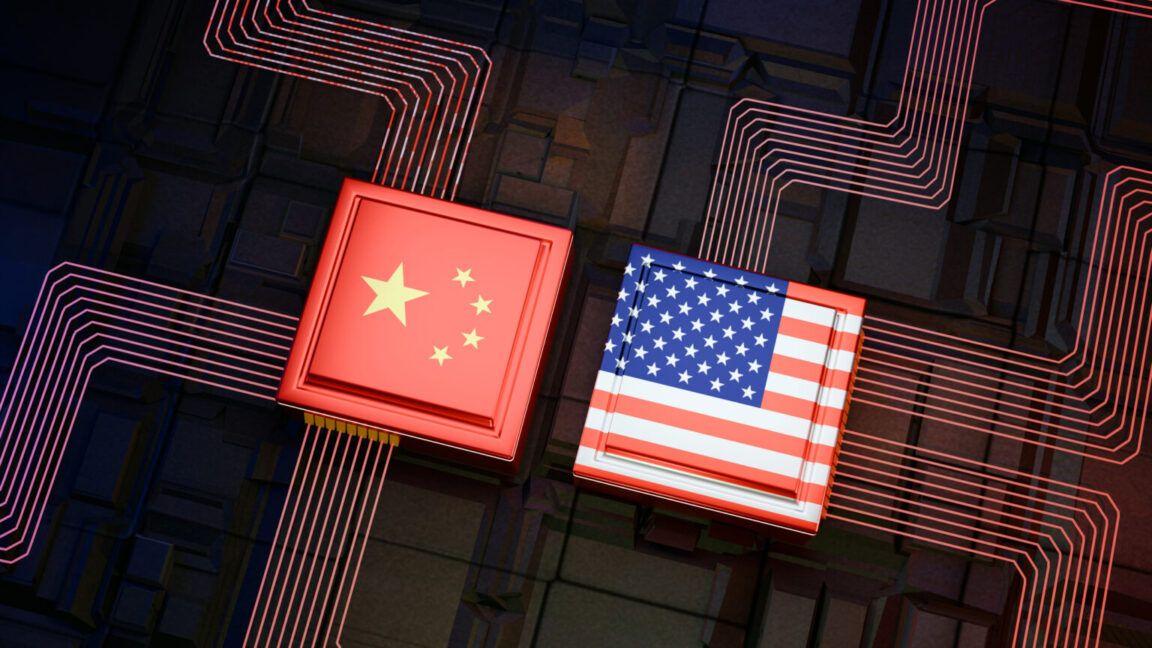U.S. Treasury Secretary Touts Nvidia-AMD China Deal as Potential Model for Future Trade Agreements
3 Sources
3 Sources
[1]
Bessent says unusual Nvidia, AMD revenue-sharing deal could be a 'model' for other industries
President Donald Trump surprised markets on Monday with a deal that was widely characterized as unusual: Nvidia and AMD will contribute 15% of their chip sales in China to the U.S. government. Treasury Secretary Scott Bessent has leaned into this new export revenue-sharing deal, saying it could serve as a blueprint for other industries. In a TV interview with Bloomberg Surveillance, Bessent praised Trump's "unique solution." "I think we could see it in other industries over time," Bessent said. "Right now, this is unique, but now that we have the model and the beta test, why not expand it?" The historic agreement essentially allows Nvidia to export its H20 accelerator chips and AMD its MI308 processors -- designed specifically for compliance with U.S. export controls -- to Chinese buyers who are hungry for advanced AI technology. Semiconductor chips, on the one hand, and rare earths materials, on the other, have been America's and China's respective leverage points as the countries seek a new trade understanding. Bessent claimed in the interview the revenue collected from the chip sales would go directly to paying down the national debt, and hinted at the possibility of channeling additional funds to taxpayers if the program proves successful. The deal itself, however, has raised considerable debate. For years, Washington's approach to export controls centered on outright bans and restriction of certain dual-use or national-security-sensitive goods. Trump's administration had previously halted all sales of advanced chips to China, citing risks of aiding Chinese military and AI efforts. But the new model seeks to find a middle ground: It enables sales while capturing U.S. value and providing leverage in ongoing negotiations with Beijing. Bessent, a former hedge fund manager and George Soros protégé who became one of Trump's closest Wall Street allies, has long argued for a strategic, results-oriented approach to American trade. His idea is U.S. companies can continue to compete globally without relinquishing leverage -- or security. The arrangement itself is unusual. It is not a tax in the traditional legislative sense, but rather a condition attached to the export license -- a point that has sparked controversy among legal experts. "It's bizarre in many respects and pretty troubling since Congress didn't have anything to say about this," Gary Hufbauer of the Peterson Institute for International Economics, told The Hill. He noted direct revenue-sharing agreements negotiated by the president and individual firms are without precedent in U.S. trade history.
[2]
Bessent sees Nvidia, AMD China agreements as a model for others
Washington | Treasury Secretary Scott Bessent said the recent deal to allow Nvidia and Advanced Micro Devices to resume lower-end AI chip sales to China, on the condition they give the US government a 15% cut of the related revenue, could serve as a model for others. "I think we could see it in other industries over time," Bessent said on Wednesday (Thursday AEST) in a television interview on Bloomberg Surveillance. "Right now, this is unique, but now that we have the model and the beta test, why not expand it?"
[3]
Scott Bessent Says Nvidia-AMD China Revenue Deal Could Serve As 'Model' For Other Industries - NVIDIA (NASDAQ:NVDA), Advanced Micro Devices (NASDAQ:AMD)
Treasury Secretary Scott Bessent has praised the 15% revenue-sharing agreement between the U.S. government and chip giants Nvidia Corp. NVDA and Advanced Micro Devices Inc. AMD. Deal Structure Breaks New Ground President Donald Trump announced on Monday that Nvidia and AMD will contribute 15% of their China chip sales to the U.S. government as part of export licensing conditions. The agreement allows Nvidia to export H20 accelerator chips and AMD to sell MI308 processors that are designed for U.S. export control compliance to Chinese buyers seeking advanced artificial intelligence technology. See Also: Ron DeSantis Slams 'Suspiciously-Timed' Congressional Stock Trades, 'Windfall Profits:' Says Nancy Pelosi Outperforms The Best Hedge Funds Bessent Sees Broader Applications In a Bloomberg Surveillance interview, Bessent called Trump's approach a "unique solution" with expansion potential across industries. "I think we could see it in other industries over time," Bessent said. "Right now, this is unique, but now that we have the model and the beta test, why not expand it?" The former hedge fund manager and George Soros protégé stated that the revenue collected would go directly toward paying down the national debt, with potential taxpayer benefits if the program succeeds. Legal Experts Raise Concerns The arrangement has sparked controversy among legal experts who question its precedent. Gary Hufbauer of the Peterson Institute for International Economics, according to The Hill called the deal "bizarre" and "troubling," noting Congress had no input on the revenue-sharing condition attached to export licenses. "Direct revenue-sharing agreements negotiated by the president and individual firms are without precedent in U.S. trade history," Hufbauer said. Market Impact Varies by Exposure AMD faces greater China exposure at 24% of fiscal 2024 net sales, compared to Nvidia's roughly 13% revenue dependence. AMD generated $7.69 billion in recent quarterly revenue, while China represents approximately $6.2 billion in annual revenue for the company versus Nvidia's estimated $17 billion. Read Next: 'Sit In The Boat' And Wait For 1 Or 2 Trades A Year: Larry McDonald Says Charlie Munger, David Tepper, Einhorn Follow The Same Playbook Photo courtesy: Photo: Shutterstock AMDAdvanced Micro Devices Inc$183.30-0.61%Stock Score Locked: Edge Members Only Benzinga Rankings give you vital metrics on any stock - anytime. Unlock RankingsEdge RankingsMomentum87.41Growth92.43Quality75.69Value11.51Price TrendShortMediumLongOverviewNVDANVIDIA Corp$181.36-0.13%Market News and Data brought to you by Benzinga APIs
Share
Share
Copy Link
Treasury Secretary Scott Bessent praises the unique 15% revenue-sharing agreement between the U.S. government and chip giants Nvidia and AMD for AI chip sales to China, suggesting it could be a blueprint for other industries.
Unprecedented Revenue-Sharing Agreement
In a surprising move, President Donald Trump has brokered a unique deal with chip giants Nvidia and Advanced Micro Devices (AMD), allowing them to resume sales of specific AI chips to China under a revenue-sharing agreement. The arrangement requires the companies to contribute 15% of their China chip sales revenue to the U.S. government
1
.Treasury Secretary Scott Bessent, a former hedge fund manager and George Soros protégé, has praised this agreement as a "unique solution" that could potentially serve as a model for other industries
2
. In a television interview with Bloomberg Surveillance, Bessent stated, "I think we could see it in other industries over time. Right now, this is unique, but now that we have the model and the beta test, why not expand it?"3

Source: Benzinga
Specifics of the Deal
The agreement allows Nvidia to export its H20 accelerator chips and AMD to sell its MI308 processors to Chinese buyers. These chips have been specifically designed to comply with U.S. export controls while still meeting the demand for advanced AI technology in China
1
. This arrangement marks a significant shift from the previous administration's approach, which had halted all sales of advanced chips to China due to national security concerns.Bessent claims that the revenue collected from these chip sales will be directly applied to paying down the national debt. He also hinted at the possibility of channeling additional funds to taxpayers if the program proves successful
1
.Market Impact and Company Exposure
The deal's impact varies based on each company's exposure to the Chinese market. AMD faces greater China exposure, with approximately 24% of its fiscal 2024 net sales coming from China. This translates to about $6.2 billion in annual revenue. In contrast, Nvidia's dependence on Chinese revenue is around 13%, estimated at $17 billion
3
.Related Stories
Legal and Policy Implications
While Bessent and the Trump administration view this deal as a strategic approach to maintaining U.S. competitiveness without relinquishing leverage or security, the arrangement has sparked considerable debate among legal experts and policymakers.
Gary Hufbauer of the Peterson Institute for International Economics called the deal "bizarre" and "troubling," noting that Congress had no input on the revenue-sharing condition attached to export licenses. He emphasized that "direct revenue-sharing agreements negotiated by the president and individual firms are without precedent in U.S. trade history"
1
3
.The legal basis for this arrangement is unclear, as it is not a traditional tax but rather a condition attached to export licenses. This has raised questions about the extent of executive power in trade negotiations and the potential need for congressional oversight.
Potential for Expansion
Bessent's enthusiasm for the deal suggests that the administration may be considering similar arrangements in other industries. This could potentially reshape U.S. trade policy, moving away from outright bans and restrictions towards more nuanced approaches that allow for continued engagement with global markets while maintaining leverage in negotiations with countries like China
1
.As this new model is tested and evaluated, it will likely face scrutiny from various stakeholders, including lawmakers, industry leaders, and international trade partners. The success or failure of this "beta test," as Bessent calls it, could have far-reaching implications for U.S. trade policy and international business relations in the coming years.
References
Summarized by
Navi
[1]
[2]
Related Stories
Nvidia and AMD to Pay 15% of China AI Chip Sales Revenue to US Government
04 Aug 2025•Business and Economy

U.S. Imposes 15% Revenue Share on Nvidia and AMD's AI Chip Sales to China Amid Escalating Tech Rivalry
05 Aug 2025•Policy and Regulation

Nvidia's H20 Chip Caught in US-China AI Trade Tensions
10 Aug 2025•Technology

Recent Highlights
1
ByteDance's Seedance 2.0 AI video generator triggers copyright infringement battle with Hollywood
Policy and Regulation

2
Demis Hassabis predicts AGI in 5-8 years, sees new golden era transforming medicine and science
Technology

3
Nvidia and Meta forge massive chip deal as computing power demands reshape AI infrastructure
Technology





